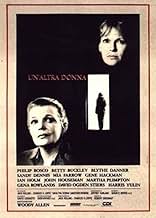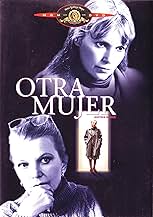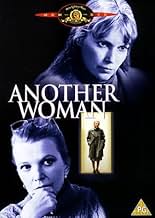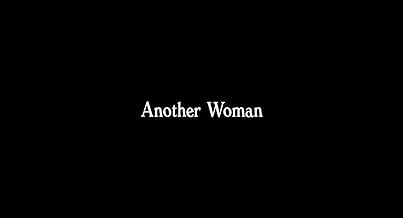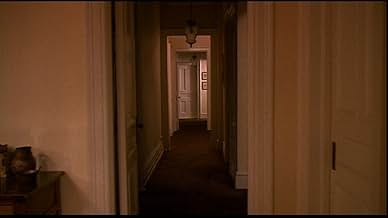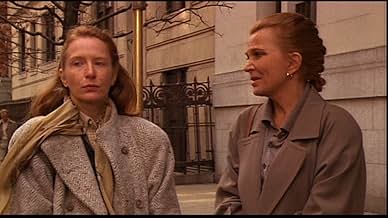IMDb-BEWERTUNG
7,2/10
15.758
IHRE BEWERTUNG
Eine Frau in der Midlife-Crisis mietet eine Wohnung neben der Praxis eines Psychiaters, um ein neues Buch zu schreiben, und wird von der Notlage einer schwangeren Frau angezogen, die den Arz... Alles lesenEine Frau in der Midlife-Crisis mietet eine Wohnung neben der Praxis eines Psychiaters, um ein neues Buch zu schreiben, und wird von der Notlage einer schwangeren Frau angezogen, die den Arzt um Hilfe ersucht.Eine Frau in der Midlife-Crisis mietet eine Wohnung neben der Praxis eines Psychiaters, um ein neues Buch zu schreiben, und wird von der Notlage einer schwangeren Frau angezogen, die den Arzt um Hilfe ersucht.
- Auszeichnungen
- 1 Gewinn & 3 Nominierungen insgesamt
Empfohlene Bewertungen
The melancholic mood and Gena Rowland's impressing acting are the most important elements of this movie. It's the Ingmar-Bergman type of film, like Interiors`, much more serious and thoughtful than all of Woody Allen's other movies, not at all typical for him. In my opinion, it's even more vivid than Interiors` because there are less people involved and something that happens less and less in Woody Allen's movies there is only one main character. This time, it's the character herself who tells the story which is really unusual for Allen.
By leaving every other trade mark in plot and topics away, Allen concentrates on the intellectual dialogues and the analyses people make about each other. It's characteristic that Marion Post is a professor for philosophy. She automatically analyzes everybody around her, which leads to the fact that they start analyzing her. Her crisis begins, when she learns that people talk about her which, of course, is something completely natural and therefore starts analyzing herself. Her character really impressed me because I know people myself who are exactly like Marion Post. Woody Allen is a brilliant psychologist who watches people precisely and that's why he is able to create such believable characters.
By leaving every other trade mark in plot and topics away, Allen concentrates on the intellectual dialogues and the analyses people make about each other. It's characteristic that Marion Post is a professor for philosophy. She automatically analyzes everybody around her, which leads to the fact that they start analyzing her. Her crisis begins, when she learns that people talk about her which, of course, is something completely natural and therefore starts analyzing herself. Her character really impressed me because I know people myself who are exactly like Marion Post. Woody Allen is a brilliant psychologist who watches people precisely and that's why he is able to create such believable characters.
Devastating, unlike anything I've seen from Woody Allen so far. This was a very quiet, deliberately paced exploration into a woman facing a mid-life crisis, played with extraordinary skill by Gena Rowlands. It leaned maybe a little too much on narration when it could have utilized her talent as an actress instead, but that's a small complaint when the final result is so powerful.
Rowlands' Marion Post rents an apartment in order to work on her novel and, through hearing the patients of the psychiatrist's office next door, slowly begins to examine her life and the choices that she has made. We see her interact with those surrounding her, be it her husband, her daughter, her brother, but she always feels a level removed from all of them. Over the years she has isolated herself from everyone around her and examines them rather than interacts, and Rowlands plays this with a knowledge so fitting and serene.
There's an extended dream sequence a little over halfway through the picture that is one of the most surreal, emotional and illuminating experiences I've had in a Woody Allen picture and one of my favorite moments in the twenty or so films of his I've seen. It imagines her life as a stage play that she watches take place, and it opens the world back up to Marion, which is displayed in master strokes on the all-telling face of Rowlands. She gives a performance for the ages here, working mostly from the inside out, although there are a few devastating scenes of her letting herself fall apart.
I was surprised at how little Mia Farrow was in it, given that she's on the cover for it and the plot synopsis makes her part seem a lot more major, but she manages to leave an impression, although the most surprising of the supporting cast was Gene Hackman. I'm used to seeing him (and loving him) in varying crime pictures, so it was nice to see him take on a more grounded and every day character, which despite only appearing for a brief time he manages to leave a lasting impression with his emotionally conflicted portrayal. You can really feel this character that he displays, feel his love and heartache in every breath.
Still, the film absolutely belongs to Rowlands, who resonated so deeply inside of me and will surely stick there for a while. She knocks it out of the park in a film that is so unique, cerebral and magnificent from Woody Allen.
Rowlands' Marion Post rents an apartment in order to work on her novel and, through hearing the patients of the psychiatrist's office next door, slowly begins to examine her life and the choices that she has made. We see her interact with those surrounding her, be it her husband, her daughter, her brother, but she always feels a level removed from all of them. Over the years she has isolated herself from everyone around her and examines them rather than interacts, and Rowlands plays this with a knowledge so fitting and serene.
There's an extended dream sequence a little over halfway through the picture that is one of the most surreal, emotional and illuminating experiences I've had in a Woody Allen picture and one of my favorite moments in the twenty or so films of his I've seen. It imagines her life as a stage play that she watches take place, and it opens the world back up to Marion, which is displayed in master strokes on the all-telling face of Rowlands. She gives a performance for the ages here, working mostly from the inside out, although there are a few devastating scenes of her letting herself fall apart.
I was surprised at how little Mia Farrow was in it, given that she's on the cover for it and the plot synopsis makes her part seem a lot more major, but she manages to leave an impression, although the most surprising of the supporting cast was Gene Hackman. I'm used to seeing him (and loving him) in varying crime pictures, so it was nice to see him take on a more grounded and every day character, which despite only appearing for a brief time he manages to leave a lasting impression with his emotionally conflicted portrayal. You can really feel this character that he displays, feel his love and heartache in every breath.
Still, the film absolutely belongs to Rowlands, who resonated so deeply inside of me and will surely stick there for a while. She knocks it out of the park in a film that is so unique, cerebral and magnificent from Woody Allen.
This is by far my favorite Woody Allen straight drama (most of his other "serious" films, like Crimes and Misdemeanors and Husbands & Wives, have comedic moments). His third "heavy film" (after Interiors and September) is chamber drama, beautifully acted and directed. Most of the elements found in Allen's other post "Annie Hall" films are here (the upper crust Manhattan intellectuals, dysfunctional relationships), but what's missing are the laughs. The film is very serious stuff, involving repressed emotions and alienation. There is simply no place for Woody's usually nervous character in Another Woman. You can still tell that this is one of his films because of the characterizations. Gena Rowlands is in nearly every scene and is classy, as usual, and the rest of the ensemble cast is just as good. My favorites were Gene Hackman and Ian Holm. The title is fairly clever as well; it doesn't refer to what you might think.
I just watched this last night, and I've been thinking about it all day. What an amazing film! So poignant, so subtle. A woman re-evaluates her life and begins to lament the choices she made years ago. Such a simple premise, such immense possibilities.
This film demands a lot of its audience. There is no humor, no action, and very little plot. Most people won't be into this at all, I imagine, which is a shame. This film offers a really wonderful perspective on a subject that is so very rarely addressed in films today: aging. This film is about a woman taking stock of her life at the age of fifty. She looks back, she sees the choices she made and how they turned out. She sees the compromises she made to get where she is today (very successful, head of a philosophy department, about to write another book), and she begins to appreciate, for the first time, what those compromises cost.
This is, in my opinion, the central tragedy of human existence. You only get one shot at life, and no one ever tells you how to manage it. So, you make mistakes, and one day, when you're fifty, you've finally learned enough to start making the right choices. But, by that time, is it too late? This film doesn't answer that question, at least not for its central character. But it does offer hope.
The film is propelled by several dynamite performances. But, even in such a crowded field of great performances, it is not difficult to pick out Gena Rowlands, who gives an unforgettably nuanced performance as Marion, the film's central character.
You may notice that this film is propelled by a number of coincidences. Every chance encounter, however, has an eerie relevance to Marion's soul-searching. It may look contrived, but it isn't. These aren't coincidences at all. The pregnant woman, played by Mia Farrow, is instrumental in setting up each of these 'coincidences', and that character's name is Hope. I was half-expecting a "Fight Club" revelation at the end, but it never came, which is good. This film could stand both ways, and it's better for the director to leave the audience to consider the relationship between Hope and Marion on their own. Like I said, I've been thinking about it all day.
This film demands a lot of its audience. There is no humor, no action, and very little plot. Most people won't be into this at all, I imagine, which is a shame. This film offers a really wonderful perspective on a subject that is so very rarely addressed in films today: aging. This film is about a woman taking stock of her life at the age of fifty. She looks back, she sees the choices she made and how they turned out. She sees the compromises she made to get where she is today (very successful, head of a philosophy department, about to write another book), and she begins to appreciate, for the first time, what those compromises cost.
This is, in my opinion, the central tragedy of human existence. You only get one shot at life, and no one ever tells you how to manage it. So, you make mistakes, and one day, when you're fifty, you've finally learned enough to start making the right choices. But, by that time, is it too late? This film doesn't answer that question, at least not for its central character. But it does offer hope.
The film is propelled by several dynamite performances. But, even in such a crowded field of great performances, it is not difficult to pick out Gena Rowlands, who gives an unforgettably nuanced performance as Marion, the film's central character.
You may notice that this film is propelled by a number of coincidences. Every chance encounter, however, has an eerie relevance to Marion's soul-searching. It may look contrived, but it isn't. These aren't coincidences at all. The pregnant woman, played by Mia Farrow, is instrumental in setting up each of these 'coincidences', and that character's name is Hope. I was half-expecting a "Fight Club" revelation at the end, but it never came, which is good. This film could stand both ways, and it's better for the director to leave the audience to consider the relationship between Hope and Marion on their own. Like I said, I've been thinking about it all day.
This is a wonderful movie but not an easy one. It mixes the present with the past and dreams with real life. You will need to see it three or four times at least to get the best out of it but it's well worth doing. Every performance is spot on, every scene has a purpose, there is no padding here. It comes as a shock to Gena Rowlands character that she is not what she thought she was, that people do not view her in the way she thought they did.She takes a journey through her life to see what went wrong with the unwitting aid of a psychiatrist and patient in the apartment next door. The film ends abruptly without a proper resolution just as life can and does. The final line of Gena Rowlands beautiful narration will haunt you. A masterpiece of writing and direction to say nothing of superb acting and masterful cinematography.
Wusstest du schon
- WissenswertesWoody Allen is not known for complimenting his actors, saying that the fact that he casts them is proof that he considers them great. However, he has said that the scenes between Gena Rowlands and Gene Hackman, particularly in the flashback of the party, were "electrifying."
- PatzerWhilst it is true that the tune of Gymnopédie No. 1 is played at the beginning of the film, it is not the piano version but rather the orchestral version orchestrated by Debussy. For some unknown reason, Debussy changed the numbers of the Gymnopédies: thus the orchestral version of Gymnopédie No. 3 bears the tune of Gymnopédie No. 1!
- SoundtracksGymnopédie No 1
Music by Erik Satie
Performed by Orchestre de la Société des Concerts du Conservatoire
Conducted by Louis Auriacombe
Courtesy of EMI Pathé-Marconi/Capitol Records Special Markets
Top-Auswahl
Melde dich zum Bewerten an und greife auf die Watchlist für personalisierte Empfehlungen zu.
- How long is Another Woman?Powered by Alexa
Details
Box Office
- Budget
- 10.000.000 $ (geschätzt)
- Bruttoertrag in den USA und Kanada
- 1.562.749 $
- Eröffnungswochenende in den USA und in Kanada
- 75.196 $
- 16. Okt. 1988
- Weltweiter Bruttoertrag
- 1.562.749 $
Zu dieser Seite beitragen
Bearbeitung vorschlagen oder fehlenden Inhalt hinzufügen

Oberste Lücke
By what name was Eine andere Frau (1988) officially released in India in English?
Antwort

